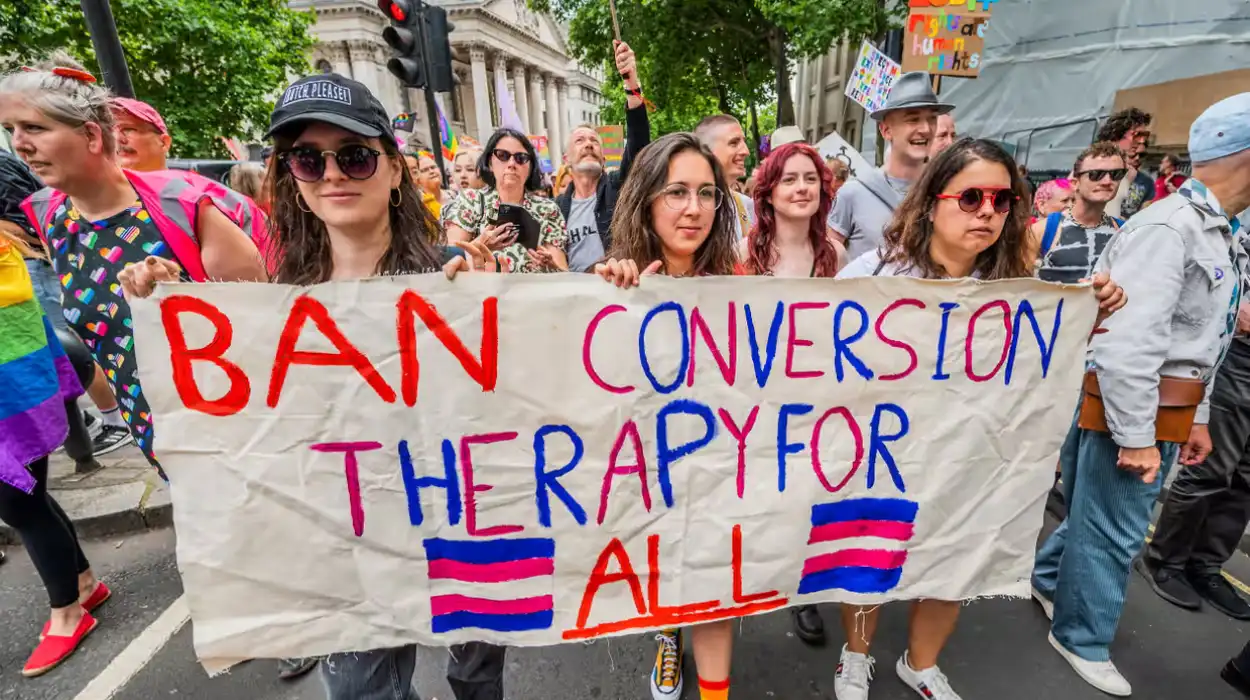UK (Parliament Politics Magazine) – Labour faces backlash as campaigners warn its failure to pass a full ban on conversion practices endangers LGBTQ+ lives and undermines human rights.
As reported by The Guardian, activists warn that Labour’s failure to implement its pledged nationwide ban on conversion therapy is seen as risky, negligent, and dismissive of LGBTQ+ individuals.
What did Saba Ali say about Labour’s delay on the conversion ban?
Saba Ali, representing the Ban Conversion Therapy Coalition, issued a firm statement, saying their message was clear,
“Stop the delay and deliver the promise. It’s been seven years since the ban was first pledged, yet LGBTQ+ people are still subjected to degrading, abusive practices while the government dithers.”
She said,
“This failure to act is not just disappointing, it is dangerous. Every delay sends a message that our lives are negotiable, that our safety is optional.”
Ms Ali, interim chair of the LGBTQ+, faith, and mental health coalition established in 2020, declared,
“We are calling for immediate, comprehensive legislation that bans all forms of conversion practices, without loopholes, without exemptions, and without leaving anyone behind.”
She added,
“This must include explicit protections for trans and non-binary people, and criminalise the promotion, referral and practice of these so-called “therapies” in all settings, including religious and “consensual” ones. We also demand real support for survivors, and an independent watchdog to ensure accountability.”
Ms Ali acknowledged that Equalities Minister Bridget Phillipson reaffirmed Labour’s commitment to a trans-inclusive ban in the Commons last month, but remarked,
“The government must turn promises into protection because human rights should never be up for debate.”
Labour delayed progress on banning conversion therapy
The coalition has expressed its growing frustration after Labour sources assured progress on the trans-inclusive conversion therapy ban. Despite these assurances, the promised bill, aimed at protecting sexual orientation and gender identity, has not advanced as expected.
Under the Tory government in 2022, plans for a similar ban collapsed, driven by attempts to exclude trans people and fears of an “informed consent” loophole.
Why is Labour hesitant on gender reform?
Activists have raised concerns that Labour is avoiding the issue following the Supreme Court’s biological sex ruling, which does not legally affect the proposed ban. They also point to the party’s poor performance in local elections as a contributing factor.
Labour’s fears about the growing popularity of Reform are believed to have led to the delay of plans to update the gender recognition process in January. They were concerned that it would give Nigel Farage a political advantage.
What did the government spokesperson say about conversion practices?
A UK government spokesperson stated,
“Conversion practices are abuse – such acts have no place in society and must be stopped.”
They added,
“We committed to bringing forward legislation to finally ban conversion practices as one of our legislative priorities set out in the King’s Speech.”
Why did Scotland scrap its conversion therapy ban plans?
The Scottish government has decided to abandon its plans for a separate conversion therapy ban via Holyrood legislation. Instead, it will collaborate with UK ministers to create a UK-wide ban. This decision follows growing concerns and calls for a unified approach to end these harmful practices across the nation.
Supreme Court’s views on trans women and the Equality Act
On April 16, the Supreme Court concluded that trans women are not legally considered women under the Equality Act.
In a detailed 88-page ruling, Lord Hodge, Lord Reed, Lord Lloyd-Jones, and Ladies Rose and Simler stated that although the word “biological” does not appear in the Equality Act’s definition of man or woman,
“the ordinary meaning of those plain and unambiguous words corresponds with the biological characteristics that make an individual a man or a woman.”

